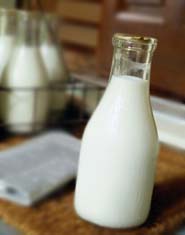Lactose Intolerance

Do you find after drinking a large glass of milk, that soon after you suffer from stomach cramps, bloating, flatulence (wind), or even diarrhoea? If this is the case it may mean you are suffering from lactose intolerance. It is a condition that is usually inherited; however symptoms sometimes will not appear until adulthood. If you suspect you have it track your relatives down and ask them a few questions about their diet (then you can secretly blame them for giving you this painful and annoying condition - just kidding). It can also occur after an episode of gastroenteritis, however if this is the case it will usually resolve by itself after recovery of the gastro infection.
So what causes it?
It occurs when there is a deficiency in lactase in the stomach. Lactase is a digestive enzyme that helps the stomach to breakdown milk sugar. This means if you have the condition, you will not be able to break down the sugar in milk. If you don't have enough of this enzyme lactase, an imbalance of water in the stomach will occur when you consume milk (or milk products). This means you cannot absorb lactose efficiently and causes water to remain in the stomach, which can produce symptoms such as:
Stomach cramps
Nausea
Bloating
Diarrhoea
It can also cause problems in your bowels, (which is not only painful, but also embarrassing). This is because the lactose from the milk was not broken down by the enzyme lactase in the stomach. Therefore when the lactose passes into the bowels, fermentation of the remaining lactose occurs. This can cause symptoms such as:
Flatulence (which can be a annoying and embarrassing problem)
Lower abdominal pain (from flatulence)
Distention (bloating from water retention in the bowel).
Can this be diagnosed?
Yes. A test can be taken from your doctor. This is called a lactose intolerance test, which can indicate low levels of lactate in your intestines.
So what happens if you have it?
Some people may only suffer from this condition to a mild degree. Mild being that you need to drink more than ½ a litre to have any symptoms. If this is the case, you just need to make sure you don't overdo it on the milk and milk products in a day. If you find this condition is a real problem in your life, you need to stay away from milk and milk products. Try drinking soymilk instead of animal milk, as soy contains no lactose, and you can still get the nutritional benefits that a milk product can give, as soy is also high in calcium. Your doctor may also suggest the use of enzyme drops or tablets that may help with the symptoms.
- Louise Ganey
So what causes it?
It occurs when there is a deficiency in lactase in the stomach. Lactase is a digestive enzyme that helps the stomach to breakdown milk sugar. This means if you have the condition, you will not be able to break down the sugar in milk. If you don't have enough of this enzyme lactase, an imbalance of water in the stomach will occur when you consume milk (or milk products). This means you cannot absorb lactose efficiently and causes water to remain in the stomach, which can produce symptoms such as:
Stomach cramps
Nausea
Bloating
Diarrhoea
It can also cause problems in your bowels, (which is not only painful, but also embarrassing). This is because the lactose from the milk was not broken down by the enzyme lactase in the stomach. Therefore when the lactose passes into the bowels, fermentation of the remaining lactose occurs. This can cause symptoms such as:
Flatulence (which can be a annoying and embarrassing problem)
Lower abdominal pain (from flatulence)
Distention (bloating from water retention in the bowel).
Can this be diagnosed?
Yes. A test can be taken from your doctor. This is called a lactose intolerance test, which can indicate low levels of lactate in your intestines.
So what happens if you have it?
Some people may only suffer from this condition to a mild degree. Mild being that you need to drink more than ½ a litre to have any symptoms. If this is the case, you just need to make sure you don't overdo it on the milk and milk products in a day. If you find this condition is a real problem in your life, you need to stay away from milk and milk products. Try drinking soymilk instead of animal milk, as soy contains no lactose, and you can still get the nutritional benefits that a milk product can give, as soy is also high in calcium. Your doctor may also suggest the use of enzyme drops or tablets that may help with the symptoms.
- Louise Ganey
MORE
- Best Snacks For Brain Health
- Antoinette-Louise Barnardo Swisse Kids Health...
- How to Eat Healthy
- 5 Natural Energy-Boosting Habits
- Dr. Ross Walker How Food Can Help With Heart...
- Top 5 Nutrient Boost Tips
- 10 Brain Foods Everyone Should be Eating
- Lee Holmes 2017 Health Trends Interview
- PureBred Seven Day Gluten-Free Challenge
- Study Suggests Poor Quality Diet Linked To...
- I Quit Sugar for Life
- Mad For Health 8 Food Myths
- Never Be Tempted Out Of Your Gluten-Free Diet...
- Melanie McGrice AIA Healthier Habits in 2014...
- Natural Remedies The Latest Buzz For Bites You
- Bosisto's Lavender Packs
- Chillax Natural Sleep Drink
- Beaming with Health Nighty Night
- Blackmores Eco-Krill
- Pamela Hore Bring It To The Table Interview
- Professor Kerin O'Dea Intervention on...



